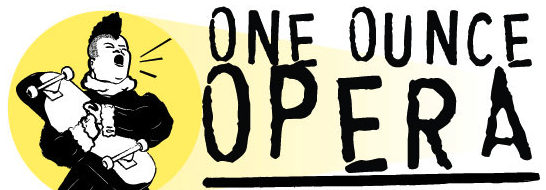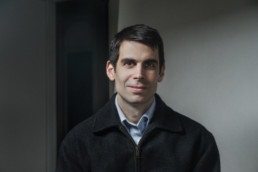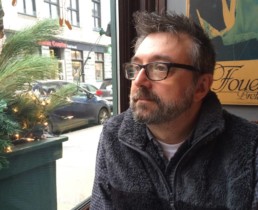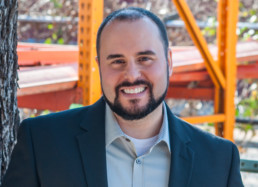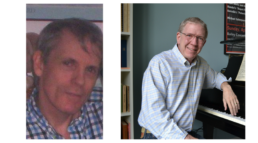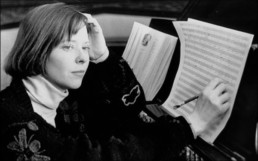Meet FSOAS '17 Winning Composer Douglas Fisk
We'd like to introduce Douglas Fisk, whose winning song cycle Banjo and Shadows sets Carl Sandburg's stirring poetry in motion. OOO's Jake Jacobsen has been preparing the piece for the 2nd Annual Fresh Squeezed Ounce of Art Song, and had these questions for the composer:
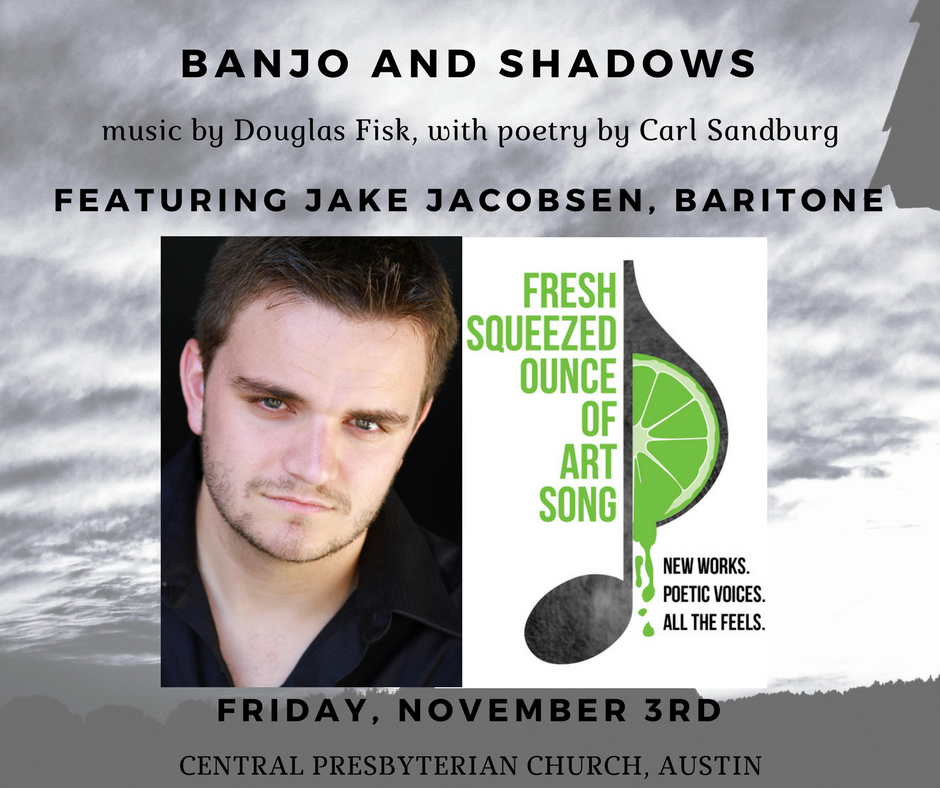 Jake: Sandburg's Chicago Poems compilation must contain at least one hundred poems. How and why did you select the ones you did?
Jake: Sandburg's Chicago Poems compilation must contain at least one hundred poems. How and why did you select the ones you did?
Douglas: I set about finding a series of poems that created a certain dramatic/emotional arc from beginning to end. In terms of selecting one poem over another -- that's largely an intuitive process, whereby a poem either seems conducive to setting or not; it's a little hard to explain, but when you find a poem that works with what you're trying to do, you recognize it. I liked the idea of ending with the “Kreisler” poem, a reference to the great violinist Fritz Kreisler, with the poem’s last lines suggesting a continuation even at the end of the cycle.
Jake: What was the biggest challenge setting these pieces?
Douglas: Setting these poems came relatively quickly once I settled on the poems. The fourth poem used in the cycle, “From The Shore,” required a slightly different approach due to its greater length.
Jake: Have you set Sandburg's texts before? If not, do you see yourself coming back to this poet in the future?
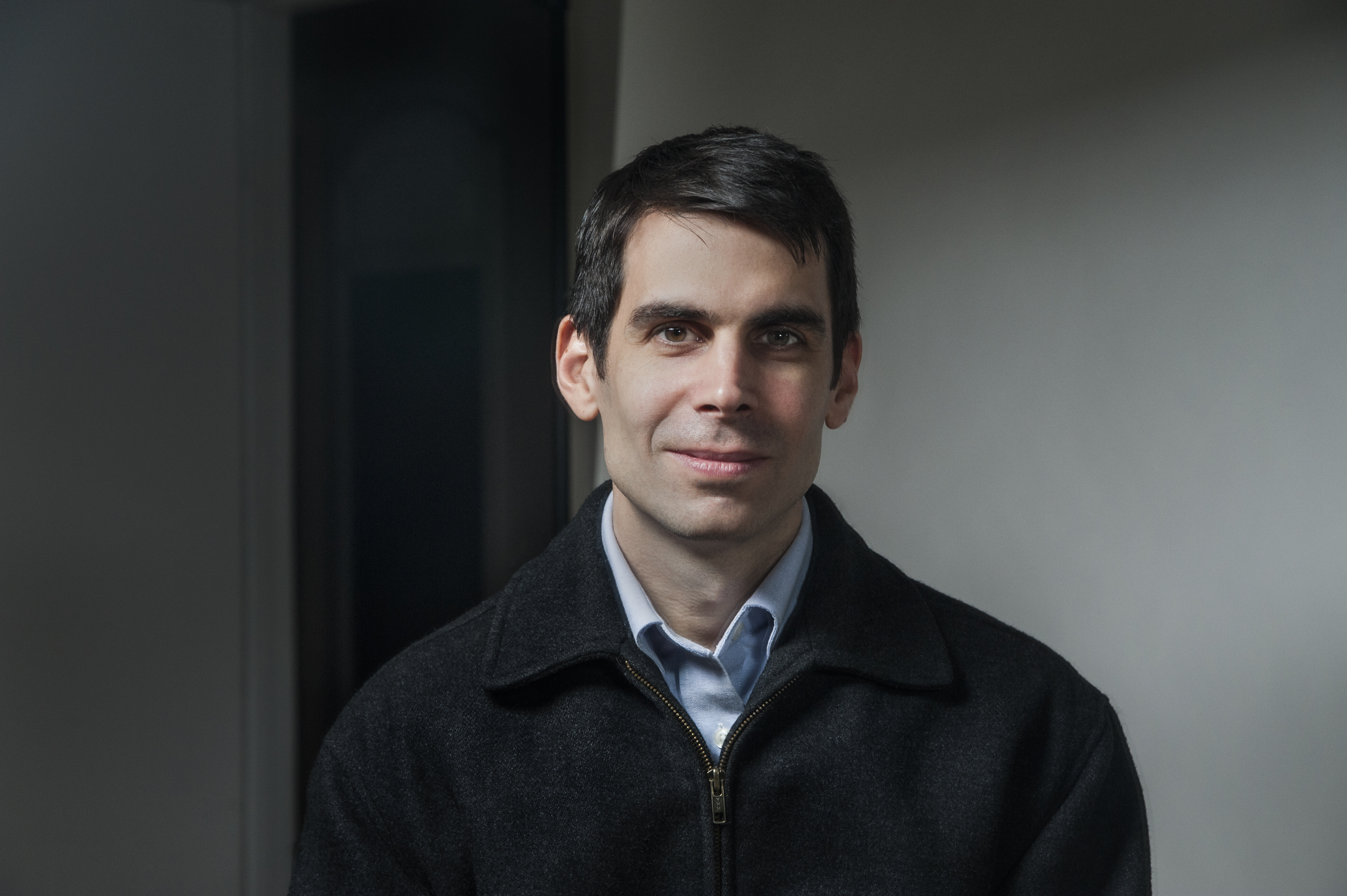
Douglas: Yes, in fact one of the earliest pieces I wrote when starting out as a composer was a setting of five other Sandburg poems from Chicago Poems, titled Sandburg Songs. That was written in 2002. Carl Sandburg was a poet I felt a connection with as I was growing up, and I had a copy of his collected poems that I'd read from regularly. I still feel that connection to his work, so it has felt natural to sometimes revisit his work when I’m looking for poetry to set.
Get your tickets to FSOAS '17 to hear Douglas' work in person!
____
Douglas Fisk is active as a composer, pianist, and teacher. His music has been performed by members of the New York New Music Ensemble, percussionist Gwendolyn Burgett, baritone Malcolm Merriweather, and Sospiro Winds. He has studied composition with Paul Barsom, Bruce Trinkley, Ezra Laderman, and Martin Bresnick. He received his MM and MMA degrees from the Yale School of Music. He has attended the Oregon Bach Festival Composers Symposium, the June in Buffalo festival, the European American Musical Alliance program in Paris, France, where he studied with Claude Baker, and been in residence at the Millay Colony for the Arts.
To find out more about Douglas, visit his website http://douglasfiskmusic.com.
Meet FSOAS '17 Winning Composer Kevin March
On Friday, November 3rd, One Ounce Opera will premiere an important piece -- Songs of Remembrance and Resistance -- at the 2nd Annual Fresh Squeezed Ounce of Art Song. OOO soprano Amy Selby, along with Veronica Williams, will perform the song cycle. Let's hear about it from Amy and composer Kevin March now.
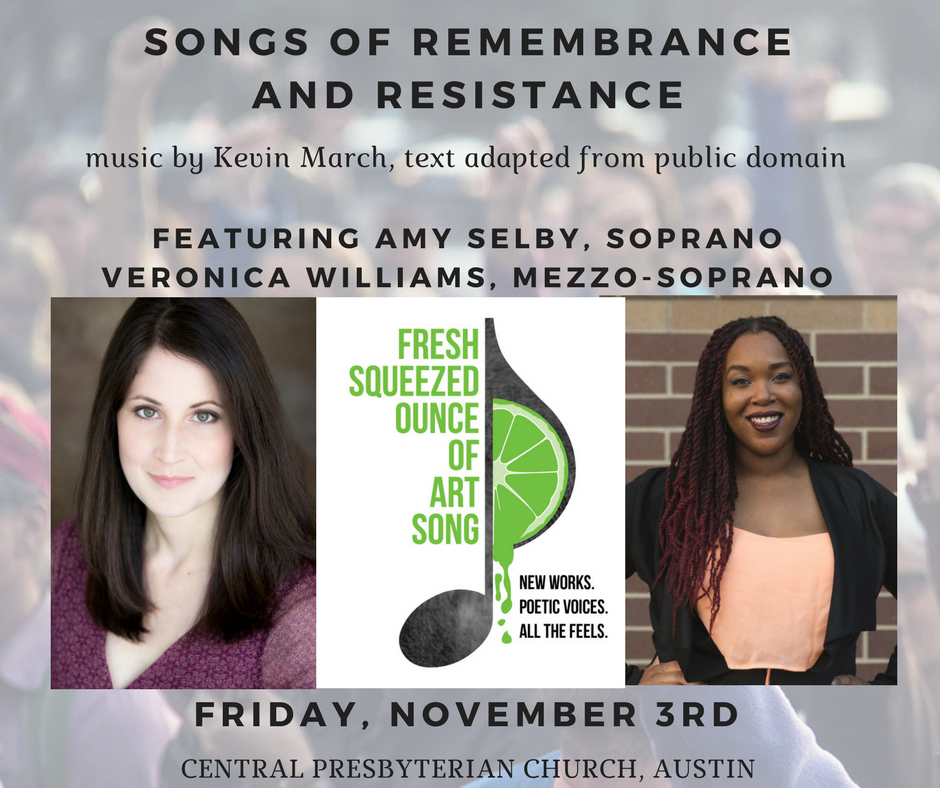 Amy: It will be a pleasure to perform your pieces from your set at One Ounce Opera's Fresh Squeezed Ounce of Art Song in a few weeks!
Amy: It will be a pleasure to perform your pieces from your set at One Ounce Opera's Fresh Squeezed Ounce of Art Song in a few weeks!
You mention in the score that, "Principled women taking principled action in the face of patriarchal warnings, persisting in spite of fear, harm or threat of harm, are to be found throughout recorded history and across cultures." Out of all of the women in history, what was it about these particular women that influenced you to choose to group them together in this set?
What composers, one living and one from the past, have had the most impact in helping you form your own style of composition? What particular features from their works inspire you?
Kevin: It’s a pleasure to have had my cycle chosen for the concert and to have it in your capable hands, or rather, voice. Thank you also for the thoughtful questions.
As to why I chose these particular women for the cycle: to put it quite simply, they saw one thing that was within their power to do and they did it. “I will save this life.” “I will resist this injustice.” “I will not accept this behaviour.” I found it remarkable that, for these women, their extraordinary responses seemed, to them, the obvious thing to do. That's both challenging and inspiring. I should also add that I have three more songs in various stages of completion, which will be added to the cycle later.
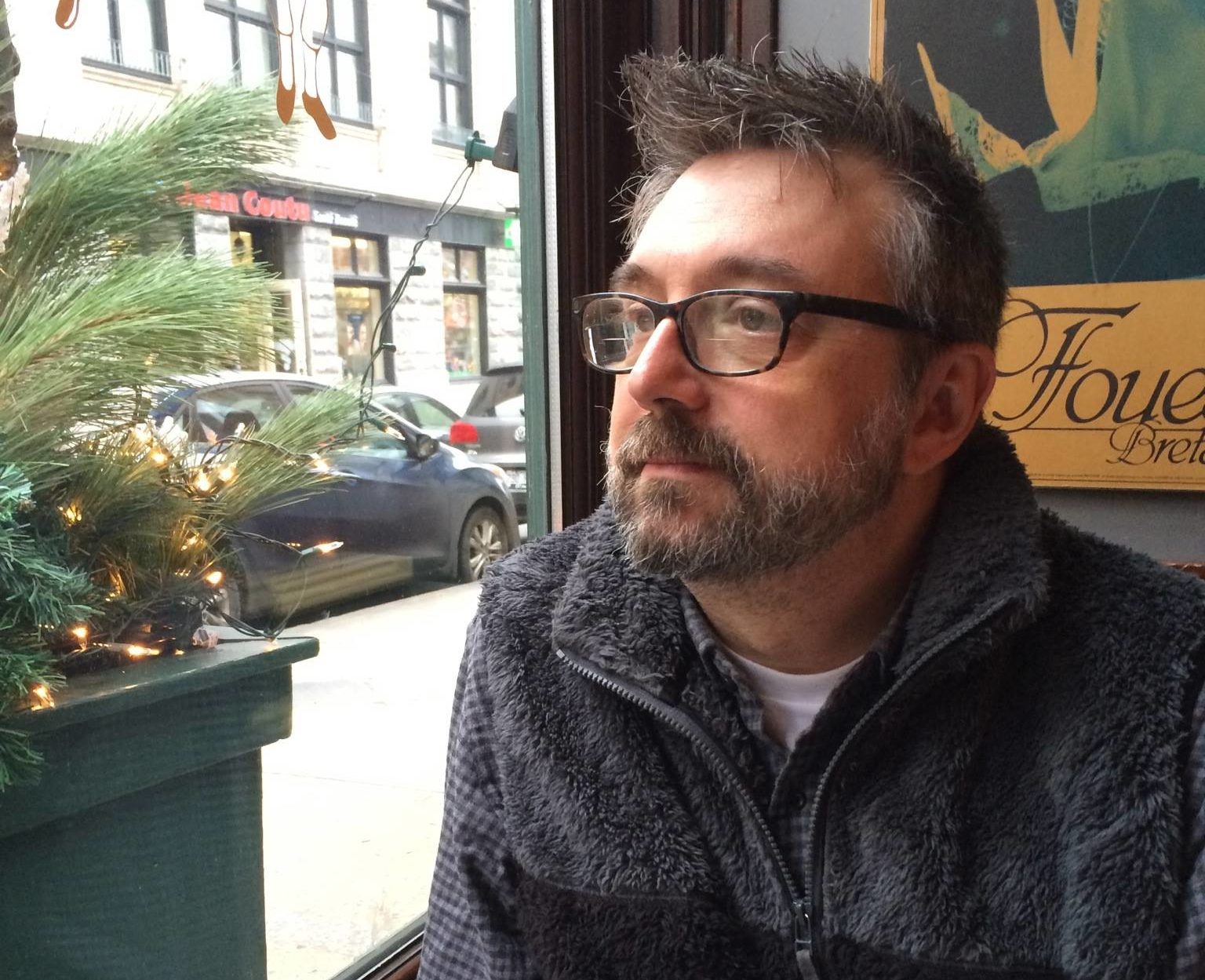
As for composers who’ve had an influence: with respect to my vocal music, the American composer William Bolcom, with whom I studied while I did my Masters and Doctorate at University of Michigan, and Claude Debussy are probably my biggest inspirations. Both are masters of text setting; both brilliantly employ every musical element to convey the text.
Experience Songs of Remembrance and Resistance on Friday, November 3rd!
_____
Kevin March is an award-winning, composer who’s works have been performed in North America, Australia, an Europe by Opéra de Montréal, Pacific Opera Victoria, the Tasmanian Symphony Orchestra, Orchestra Victoria, the New York City Opera, and numerous chamber ensembles and soloists.
His works have been featured in the Metropolis New Music Festival and the 7th Sydney Biennale. Awards include first prize in the 3MBS National Composer Awards for his orchestral work Kambarang and the Dorian La Gallienne Prize for Ophélie. His works have been broadcast on radio and featured in the ABC National documentary Modern Muses: The Greeks and New Music.
His opera, Les Feluettes (Lilies), commissioned by Opéra du Montréal premiered to sold-out audiences, standing ovations, and rave reviews in May 2016 and was subsequently nominated for a coveted Opus Award. It’s second production with Pacific Opera Victoria in April 2017 saw more full houses and standing ovations. The Edmonton Opera will give Les Feluettes its third production in 2017.
To find out more about Kevin, visit his website www.kevinmarch.com.au.
Meet FSOAS '17 Winning Composer Steven Serpa
Welcome back 2-time FSO winner Steven Serpa, Austin-based composer and singer. His winning short opera Thyrsis and Amaranth made the 2016 Fresh Squeezed Ounce of Opera program, and has been hailed as "powerfully emotional" and "truly beautiful....a magnificent story." Maureen, who played Amaranth, takes on Serpa once again, and along with OOO newcomer Chelsea DeLorenz, will breathe life into Steven's quirky song cycle The Creatures: A Bestiary Retold on Friday, November 3rd.
And now, with the help of Maureen and Chelsea, let's spotlight Steven and his work. Enjoy!
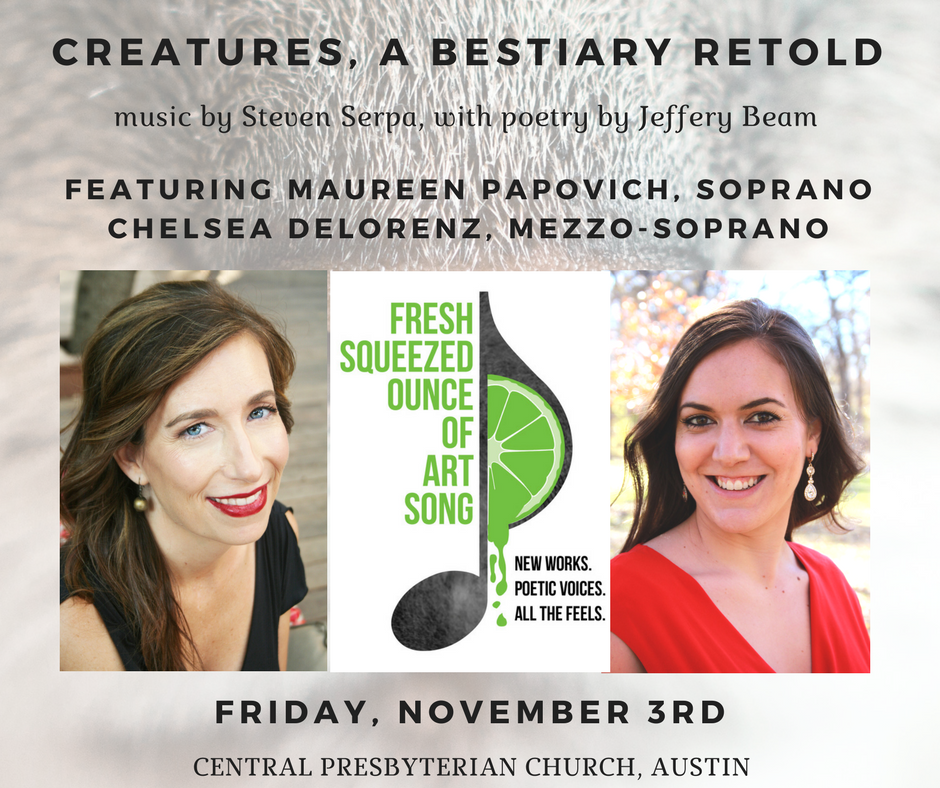 Maureen: I'm absolutely loving these pieces. I think my favorite thing about these songs is how dark parts of them are. So many songs about animals are cute and funny. I love how the poetry and music reflect a truer portrait of living beings (even the fantasy ones!)
Maureen: I'm absolutely loving these pieces. I think my favorite thing about these songs is how dark parts of them are. So many songs about animals are cute and funny. I love how the poetry and music reflect a truer portrait of living beings (even the fantasy ones!)
Anyhow, a couple of questions for you about your process with these pieces.
1. An obvious one is, how did you choose these particular 'beasts' to set?
2. I'm also curious what drew you to Jeffrey Beam's poetry to begin with. You speak in the notes about your relationship with Lee Hoiby - which is so interesting - and you talk about your love of Beam's poetry, but not how you came to find his work and what about it moves you?
Steven: Hi Maureen & Chelsea! I’m glad to hear from you and glad you’re enjoying the beast songs. I’m really looking forward to hearing what you do with these songs. After wrestling with the notes and rhythms on the bars of the music/cage, I’ve grown fond of these little monsters. Whether spikey or fuzzy, each animal has its beauty and light, their ugliness and darkness. I also think the Prologue is one of my favorite vocal things I’ve written! I’m looking forward to this.
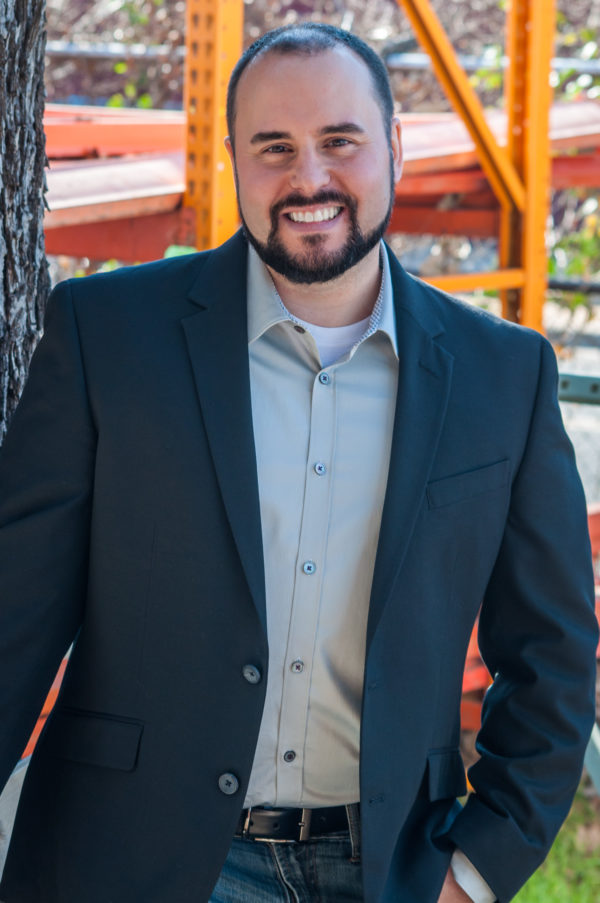
So 1st, these little monsters…
The Creatures is a work I have wanted to write for a bunch of years now. The poems are such entertaining gems. They are quirky mixtures of “scientific observation” and mysticism that Jeffery crafted from snippets of Elizabethan bestiaries. While Jeffery drew on the tradition of these medieval authors, I drew on the tradition of beast songs from the last century. So why did I choose the creatures I did? Some of the creatures I chose because composers before me had written really great works on them, like Poulenc’s Le Dromadaire or Cage’s Litany for the Whale. The others I was drawn to for the combination of myth and reality or of their beauty or power. Each creature has two sides, like all of us really: the Beaver has its sweet, playful quality but is also a crafty creature of the night– the Manticore is a dangerous man-eater with a radiant, clear voice.
So 2nd … What is it about Jeffery’s poetry…
The Creatures is actually my third work with Jeffery’s poetry. Last year the Austin Symphony Orchestra premiered my work An Invocation, a tone poem inspired by his poem of the same name. But the first time I came across his texts was in 2008 when I was writing a choral cantata for a World AIDS Day benefit in Boston. I was looking for text that possessed both memorial qualities but was also uplifting, and I found this absolutely perfect and inspiring poem:
Heaven’s hounds guard your ashes now
Shine their green light
on a humbled earth
For every gray stone
alive with moss and left
unturned by your kind feet
Heaven’s birds sing
That was my intro to Jeffery Beam’s work. Since then, I’ve extensively explored his poetry. It has inspired me and had me scheming new partnerships between his text and my music. On top of that, learning that Lee Hoiby, one of the best art song composers in the history of American song, learning that he had set Jeffery’s texts made me feel even more connected to the poetry. Lee was an early mentor to me. When I first started composing, he graciously looked over my songs and gave me words of criticism and support. I feel like these songs are a spiritual return to those early songs, and so I’ve dedicated them to Lee Hoiby’s memory.
Hear The Creatures come to life on Friday, November 3rd at 8pm!
_____
Steven Serpa is a composer whose music has won recognition with ensembles and opera companies across the United States, Canada and Europe. His work An Invocation was recently premiered by the Austin Symphony Orchestra and featured on the TreeFalls new music series in Spartanburg, SC. His one-act opera Thyrsis & Amaranth was premiered by Hartford Opera Theater in 2011 and has since been produced in Halifax, Cincinnati, Austin, St. Louis, and recently at Syracuse University. Critics praised Thyrsis as "Truly beautiful… a magnificent little story jammed full of thought and feeling and meaning" with “gorgeous music and wrenching lyrics.”
To find out more about Steven, visit his website http://serpamusic.com.
Meet FSOAS '17 Winning Composers Rodney Rawlings and Michael Scherperel
OOO's newest tenor, Brian Minnick, joins us to showcase two short songs by two contemporary composers, whose works prove inspiration can happen in places you least expect. Introducing When Matter Touches Antimatter by Rodney Rawlings and Up for #1 by Michael Scherperel! Here them premiere in Austin on Friday, November 3rd. Brian had these questions for the winning composers:
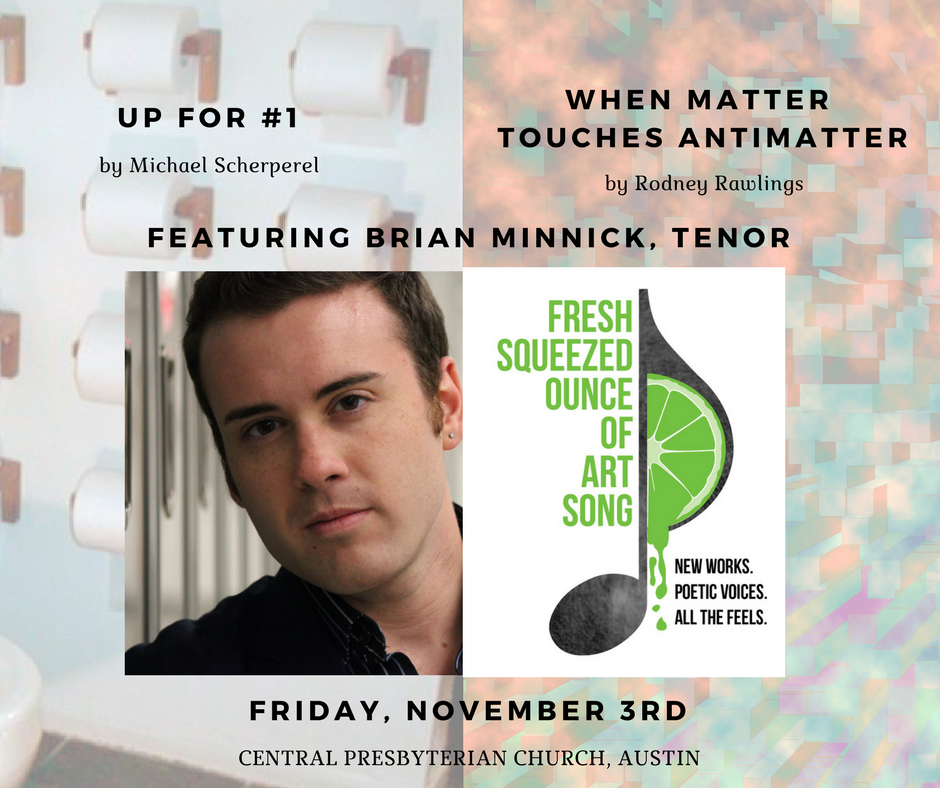 Brian: Rodney, most composers set their music to the poetry of other writers. What is it like to set your own text to music?
Brian: Rodney, most composers set their music to the poetry of other writers. What is it like to set your own text to music?
Rodney: Actually, with me the melody always comes first and I write the words to it. A few times, as in my “Ave Maria (Ellen’s Prayer),” I have taken a famous poem as my basic text, but I always freely adapted the words to the music, preserving the feeling and theme, sometimes adjusting the music a bit but keeping the melody’s integrity.
When I write lyrics, often the words come easily at first; but gradually the constraints of rhyme scheme, the effect I wish to preserve, and melody paint me into a corner toward the final cadence, and I am racking my brains to express all I want to within my set musical phrases. If no inspiration comes, I am occasionally forced to change the melody or structure of the song.
Brian: When Matter Touches Antimatter as some really nice jazzy moments. What styles of music inspire you and your writing?
Rodney: Thank you! Concerning categories such as jazz, classical, pop, etc., I have no preferences. I learn from and am passionate about individual works no matter what the style. I’ve analyzed scores by Beethoven, Wagner, Chopin, Bizet, and others. In this connection I must mention Franz Lehár, my first encounter with whose work in Lovro von Matačić’s recording of DIE LUSTIGE WITWE was what started me in composing. Lehár’s mastery of melody in that operetta electrified me, and also led me to a deeper appreciation of the arranger’s art.
To use the term “style” in another sense, I am partial in my own songs to styles that express yearning and reverence for the things of this Earth, such as the fugitive slave’s ordeal in my “Take Me, O St. Lawrence River (Freedom)” and the astronaut’s quest in my “To Venus and Mars.”
In others’ work, I love and study aspirational songs like “When You Wish upon a Star,” “The Wayward Wind,” and “The Long and Winding Road” and dramatic songs like “Love Is a Many-Splendored Thing” and “Dein ist mein ganzes Herz.” But the music has to be right, irrespective of the theme or style. “Silver Threads and Golden Needles,” a country song, fills me with admiration for its concept and execution.
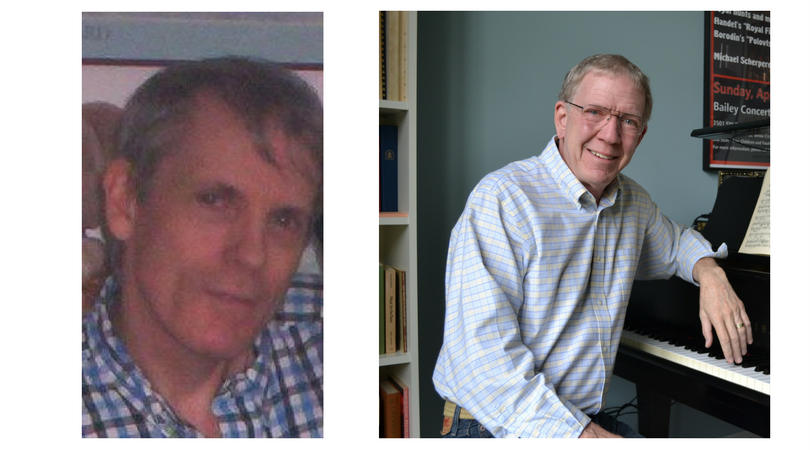
Brian: Michael, there must be a great story for the origin of this song. Would you mind sharing it?
Michael: This rather silly song was fun to write and DavidMichael Schuster (the David of the dedicatees) and I had a blast performing it. The other dedicatee, by the way, is Eric Stark, Music Director of the Indianapolis Symphonic Choir. Eric posted on Facebook a photo of the brass plaques posted next to some new toilets on the campus of Butler University and dared—jokingly, I think—his composer friends to write a song using the words. So I did!
Brian: The quick meter changes throughout give a very unique flow to the piece. What inspired you to use such different meters?
Michael: I have a bit of a penchant for meter changes. In my vocal writing, I try to let the text dictate that, of course. Such changes, along with asymmetrical rhythmic patterns, can provide a lot of amplification to text. It’s my intention—whether always fully realized or not may be another question!—to underscore some aspect of the words, whether to slow them down for emphasis or speed them up for tension. I recently conducted a recording of my chamber opera “Thompson’s Luck”, a work in which both odd meters and meter changes figure prominently. You could peruse a redacted score on my website if you’re interested. The role of Steve Thompson is particularly rife with not only rhythmic angularity but also melodic tension—lots of 7ths and 9ths—since these compositional tools seemed to me to best reflect the man’s character.
Don't miss these songs! Get tickets for the 2nd Annual Fresh Squeezed Ounce of Art Song!
____
Rodney Rawlings, a Torontonian, has had his art songs and concert band pieces performed in Toronto; in Chicago; in Chautauqua, New York; in Geneva, Illinois; in Elgin, Illinois; and in Munster, Indiana. He traces his initial passion for art song to an early encounter with Franz Lehár’s DIE LUSTIGE WITWE. Rodney writes the lyrics to almost all his songs, which concern reverence, aspiration, independence, and the future. These themes also occur in those songs for which he has adapted an existing text.
To find out more about Rodney, visit his website https://ca.linkedin.com/in/rodneyrawlings.
____
Michael Scherperel studied composition and conducting at the Eastman School of Music where his principal instrument was organ. He later undertook graduate studies in piano, composition, and conducting at Boston University. He holds a B.A. in chemistry from Harvard and a M. Mus. in accompanying from the University of Miami. Mr. Scherperel has been at various times a vocal coach at the American Institute of Musical Studies (Graz, Austria), chorusmaster and assistant conductor with the Greater Miami Opera (now the Florida Grand Opera), music director of the Broward Symphony Orchestra, and artistic director of the Fort Lauderdale Symphony Chorus. Mr. Scherperel was a founding member of the Miami Chamber Trio and makes frequent appearances in chamber music and vocal concerts.
To find out more about Michael, visit his website www.michaelscherperel.com.
Meet FSOAS '17 Winning Composer Juliana Hall
One Ounce Opera is humbled to introduce you to Juliana Hall, whose work has been performed and commissioned by some of classical music's greatest voices. We can't wait to share Juliana's duet, Music Like a Curve of Gold, on Friday, November 3rd.
The duet is a setting of Sara Teasdale's poetry. OOO Soprano Rebekah Smeltzer Staley and Mezzo-soprano Julie Silva -- who will perform the piece at Fresh Squeezed Ounce of Art Song -- had these questions for Ms. Hall:
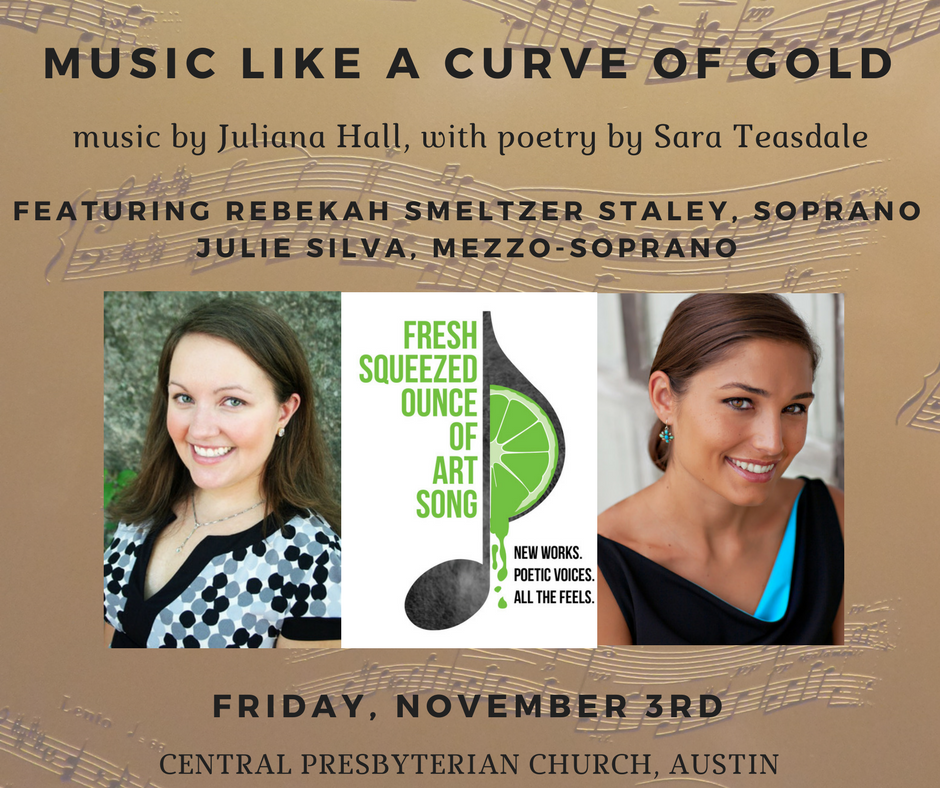 Rebekah: In looking through your bio & other interviews, it seems you had an early interest in composition, but you didn’t pursue it as a career/education option until you were working on your Masters. What finally convinced you to pursue composition?
Rebekah: In looking through your bio & other interviews, it seems you had an early interest in composition, but you didn’t pursue it as a career/education option until you were working on your Masters. What finally convinced you to pursue composition?
Juliana Hall: Having grown up in a village of 3000 people in the southern Ohio countryside, composers were - literally - the stuff of history books. I had begun piano lessons when I was six years old, with my mother, and before officially becoming a composer had studied piano very intensely for 20 years...I enjoyed playing, and just really had no sense of what a life in composition might mean in practical terms. People in history books were composers, not "us."
Despite enjoying piano, though, it never felt completely natural to me, so when I finally began taking composition lessons in graduate school at Yale, I had a sensation for the first time in my life that I had actually found an activity that felt natural, and it seemed to me that I had found a home of sorts. My teachers - Martin Bresnick, Leon Kirchner, and Frederic Rzewski - all encouraged me (and very strongly too) to change my major to composition. Perhaps without their support, I might never have become a composer...but the combination of experiencing an activity that just felt "right" at the same time that such established composers were showing me such encouragement was enough to allow me to take that leap of faith, and so my Master's degree was in composition, and not piano.
After Yale, I completed my studies with Dominick Argento. Dominick was incredibly supportive of my work, and has been for the past 30 years. He really gave me a sense of some of the practicalities I would face, were I to pursue a life of composing...not always easy realities, he didn't sugar coat the difficulties inherent in this profession. In spite of those difficulties, his support added to that of my previous teachers, and I was able to leave school with a sense that I had found my place in the world and, come what may, I would be able to create songs that helped me to express the wonderful beauty and truths the great poets open to us.
Rebekah: Why write Music Like a Curve of Gold as a duet? (Also, if the piece was a commission, did you choose the texts, or did the commissioners?)
Juliana Hall: Several years ago, the vocal duo Feminine Musique (comprised of soprano Korliss Uecker and mezzo soprano Tammy Hensrud) commissioned me for a piece, as they specialize in art song by women composers. At the time I had an idea for a very large setting of Elizabeth Bishop's poem "Roosters," which I wrote for them (and which they will be premiering on January 19, 2018 at the Hartt School of Music). However, "Roosters" is 20 minutes in length, and due to programming considerations imposed on them by presenters, they also wanted a short work that could more easily fit into shorter programs.
"Music like a Curve of Gold" was the short work, then, that resulted from their request. My husband is a cellist, and he helps me in many aspects of my career...so it was actually my husband (who has an excellent sense of how various texts go together) that chose the two poems by Sara Teasdale. I love the two poems: very lyrical and the sentiments expressed are things I believe in. They speak to the human need to feel we have lived a life worth living, that we are grateful, and that we sought goodness and beauty...and I think a vocal duo provides the perfect balance of richness reflective of the texts, while being just spare enough not to lapse into sentimentality.
Julie S: What inspired you to set Sara Teasdale's texts? What was it about her words and/or her life that drew you in?
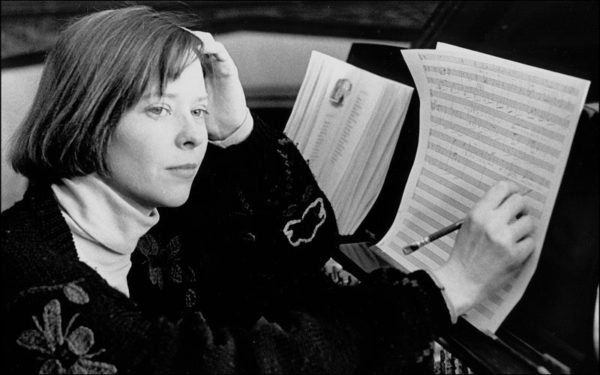
Juliana Hall: In most cases, I am not concerned with a poet's life when putting together a new piece. Of course, if I'm setting letters I might have an interest in knowing a bit more, or if - as in the case of a recent cycle of mine written on excerpts from Anne Frank's diary - there is an intrinsic connection between the texts and the person's character or life events that is stronger than usual, then I'll naturally take his or her life into account. For the most part, however, it is the text itself that I work with - just a few words in isolation, so that I can hear them "speaking" to me...and the message they convey to me becomes what I wish to convey to an audience.
In my days as a younger composer, I'd decide beforehand that I might want to write about night, or about Heaven, or about music...and then I'd find poems to fit into a cycle that worked well together...but these days when planning a new composition, I don't usually choose a topic up front, but begin by reading - a lot! I own over 200 books of poetry, and while I don't go through all of them word for word, I do a quick scan to see whether there are any poets that catch my eye, or any particular poems,or any particular topics...and my husband, who is a cellist and who is really good at putting together texts, joins me...it's a wonderful creative activity we do together, seeking a cycle that "works." It was actually my husband who found the two poems of "Music like a Curve of Gold" and since he knows great poetry, and he knows the type of poetry I tend to enjoy setting, what he found was perfect.
I enjoy very lyrical poetry, very clean and unsentimental poetry. The topics of these two poems are things I believe in very strongly...the value of beauty, and of seeing magic in the ordinary...of wanting to feel things deeply, and of wanting to fully appreciate the gifts of life and love, and all the beauty of the world around us, and the truths which flow from all of these. In these two poems, Sara Teasdale distills these ideas into pure and concise language that is full of gentle musical rhythm and vivid imagery, so they were inspiring texts to depict in musical form.
Julie S.: What is the story behind the process of this particular composition? Where do you like to do your composing, and how long does a project like this take to complete?
Juliana Hall: We live in a small, and relatively sleepy, little New England town...there's not a lot to do, and that is perfect for a composer who wants to produce! Our house is quite small, but it rises three floors, and my studio is on the third floor and has a large bay window so I can watch the birds come and go, and enjoy the trees all around.
Having studied for 20 years to become a professional pianist before I switched my focus to composition, I do my composing at the piano through improvisation. After studying the words, making sure I have a complete sense of each word's meaning and repeating the texts out loud over and over, in order to internalize the rhythm of the text, I begin by playing and singing - both at once - seeking sounds to create a meaningful sound world reflective of the text, and also seeking a vocal line that conveys the text in a way that can, hopefully, be understood without the aid of any printed matter...and in the case of "Music like a Curve of Gold" there are two vocal lines that must work together.
Composition has a number of stages. Even when I can write a song in a day, that song may very well take a full week to become final and ready to sing. Sketching out a song can take anywhere from a day to a week, depending on the size of the text...and then that pencil sketch must be input into the computer, which can take a few hours to a few days (if it's a sizable piece). Then I edit - that is, I add dynamics, expression marks like hairpins, tempos, and the like, that layer "on top of" the notes themselves. This can also take a few days or even weeks for a large cycle. Proofreading and "tweaking" follow...making sure I've correctly input notes and correctly assigned expressions markings...and then allowing myself to improve upon what I've first written, when I see there could be a "better" note here or a more "fluid" vocal line there. Again, days to weeks, depending on size of the composition. Then I give the computer file to my husband, who (since he works in electronic publishing and design) does a beautiful job of laying out the score...once again, days to weeks. After that, both he and I proofread...sometimes making as many as six "round-trips" between us.
"Music like a Curve of Gold" probably took around two months in all...sort of a long time for such a small piece, but it was my first duet piece and presented challenges I'd not encountered before, in order to use the voices in a way that gave each singer some nice lines to sing, but within the texture of a blended sound.
EXPERIENCE Music Like a Curve of Gold on Friday, November 3rd!
___
American art song composer Juliana Hall (b. 1958) is a prolific and highly-regarded composer of vocal music, whose songs have been described as “brilliant” (Washington Post), “beguiling” (Times of London), and “the most genuinely moving music of the afternoon” (Boston Globe). The NATS Journal of Singing wrote that “Hall’s text setting is spot on and exquisite”, and Voix des Arts noted that Hall “perpetuates the American Art Song tradition of Beach, Barber, and Bolcom with music of ingenuity and integrity.”
To learn more about Juliana Hall, including a full biography, please visit her website https://www.julianahall.com/.
Meet FSOAS '17 Winning Composer Marc Hoffeditz
Meet Composer Marc Hoffeditz, whose winning song Ne'er Part I will be sung by Soprano Elise Leung Kotara at the 2nd Annual Fresh Squeezed Ounce of Art Song on Friday, November 3rd.
The text is adapted from the beloved story of Peter Pan. In answering questions from Elise, Marc shares more insight, including how he hopes the audience will experience the piece.
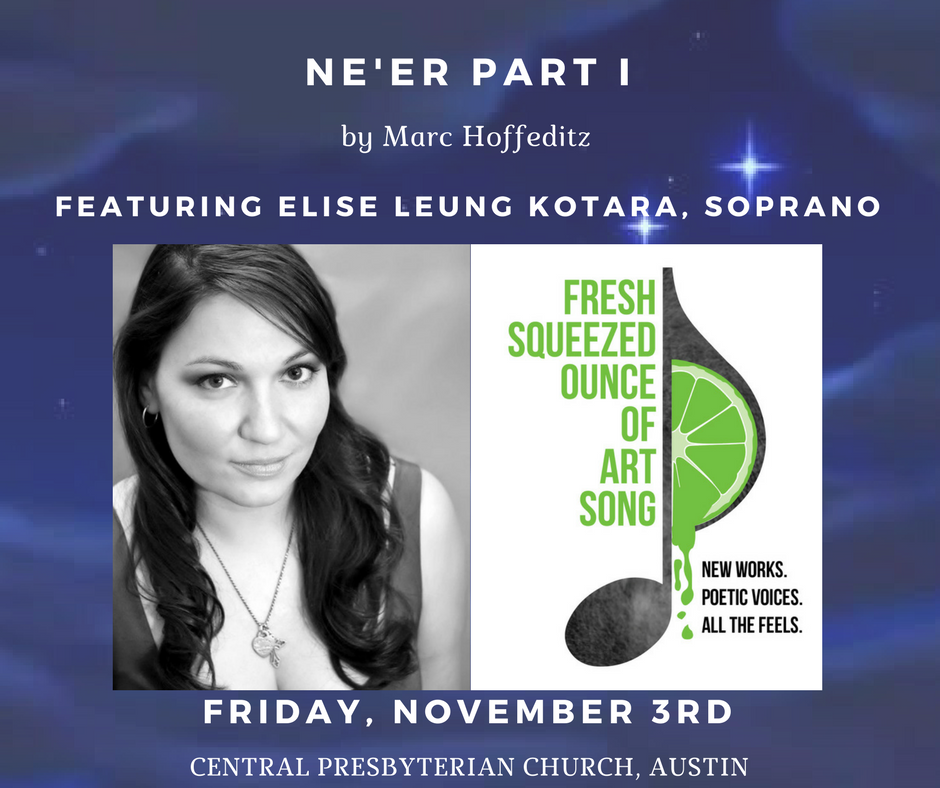 Elise: Peter Pan is a story beloved by adults and children alike. How did you go about preparing the text to be set to music, and what other decisions did you need to make about the text (the time signature, the mood of the piece, different sections of the story…)?
Elise: Peter Pan is a story beloved by adults and children alike. How did you go about preparing the text to be set to music, and what other decisions did you need to make about the text (the time signature, the mood of the piece, different sections of the story…)?
Marc: This text is specifically adapted from the 1911 novel entitled 'Peter and Wendy' (in the public domain-woohoo!), but most people are familiar with the original play (1904, still copyrighted) or the Disney movie. What I love most about this story in particular is that I feel people approach Peter Pan with a cheery mindset, but the original book has a much darker perspective of the action and is framed more from the angle of growing up and the hardships associated with the psychology of aging. 'Two is the end of the beginning' is a line from one of the earlier chapters, referencing the point in which we realize we will not be children forever, and I thought ‘WHAT. THIS IS SO CHILLING. HOW IS THIS A CHILDRENS BOOK’? So I agree, it's definitely a classic for both children and adults, but Barrie's intentions were much deeper than a silly tale about pirates and learning to fly.
A little background on how the piece came to be: It was commissioned by my friend Sarah Hennessey for her senior recital in Boston and she was looking for a piece that described the sensation of being too young to be a grownup, but being too old to be a child. Enter Peter and Wendy! The direction we decided to take was to look at the story from Wendy's perspective and frame it as her, now a mother, looking back at her adventures and reliving certain parts of her youth. A plot beyond retelling the original story was really important to me to solidify why we were revisiting this tale in particular and to help better understand the dramatic construction of the piece. In this case, the beginning, middle, and end are anchors for her role as mother and the portions between reference her transition from child to adult and vice versa.
In terms of preparing the text: I read the whole book, marking different sentences that stuck out or followed the dramatic structure I was looking for. From there, I adapted the remaining fragments into 9 movements (full version), trying to keep as much of the original text as possible instead of trying to paraphrase. Honestly, it took much longer to read, decide on, and adapt the text than it did to write the score, mainly because I was hearing the music as I was working through the story, but I'd never spent so long with the text of a piece before.

In terms of setting the text: My music in general likes to teeter between humor and pathos and I think Part 1 definitely reflects that both textually and formally. As a general rule of construction, I tried to have the more referentially 'child-like' parts of the music written in compound meters and the 'grown up' portions written in simple meters. From there, I wanted to juxtapose the blurriness of identity that Wendy felt by referencing both metrical constructs throughout the piece. This is highlighted in the 2nd movement when mother Wendy sings about her childhood in 6/8 while highlighting two main beats (1 & 4) that suggest it could be a simple meter. In the 3rd movement, Wendy is trying to act like her mother by singing in 2/4, but the appearance of gestural dance interludes that hint to a compound meter interrupt her intentions.
Although this is the first real song cycle I have written with such a strong thematic continuity, I found it important to keep things varied and interesting by trying not to telegraph what might happen next. In the end, the piece is comprised of a bunch of styles and influences, but I think the portions of recitative ground the piece and remind you that you are listening to not just a song cycle, but a very relatable story.
Elise: When did you start composing - and what or who were your early passions and influences?
Marc: I started composing little pieces back in the 6th grade. I didn't really think much of writing music seriously until my senior year, when I wrote a 26 song musical about Abraham and Mary Todd Lincoln called An American Love Story (yes, cheesy as hell). From there, I started studying composition in college and haven't stopped since! (Haven't written another musical though....but maybe that's okay)
I was a big musical theater fan in high school (hence the creation of an egregiously long musical) and I think both Stephen Sondheim and Schwartz were really early influences. The end of Pippin always made me super uncomfortable, yet I couldn’t stop going back to listen and is probably why I like the possibilities of devil’s advocacy in my music. I also remember being 17 or 18 watching Into the Woods and sobbing uncontrollably when ‘Children will listen’ started playing. I think these were really defining musical experiences and a large reason why as to why I like to re-contextualize popular stories and play with a landscape of contrasting emotional experiences
Nowadays, I think my influences include Benjamin Britten, Alban Berg, and an array of styles found in the early 20th century reinterpreted through 21st century ears. I also really respond well to Libby Larsen, Thomas Ades, and George Benjamin. Non-musical influences include anything to do with identity, especially how we formulate it today through our technological word and weird or uncomfortable subjects approached with a sense of universality and pathos.
Elise: Do you have any specific hopes about how people might experience this piece?
Marc: I don't really have any expectations of how people will perceive my works as they are happening, but I think from the performer’s perspective that knowing the larger arc and the beginning-is-the-end aspect should be highlighted. A big reason I love writing vocal music is because I love storytelling and I like to emphasize that to those that perform my works. You are NOT just a singer, you are a story teller! Tell us a story and get us hooked on whatever you are singing! The only way the audience is going to believe what is happening and what they are hearing is if you truly believe it and imbue yourself in it.
JOIN US TO EXPERIENCE ELISE PERFORM MARC'S "Ne'er Part I" on NOV. 3rd!
_____
Marc Hoffeditz is a composer of vocal and instrumental music searching to balance the humors of sarcasm, pathos, camp, and vulnerability. He has made his mark on the indie opera scene with performances by Rhymes with Opera, OperaRox Productions, Hartford Opera Theatre, and Opera from Scratch (Nova Scotia). His song cycle/monodrama Ne’er was chosen for performance at the 2016 Minnesota Source Song Festival, where he worked with acclaimed American composer Libby Larsen. Recent performances include the premiere of There will be no more, a song cycle for tenor and piano with OperaRox Productions in NYC.
To learn more about Marc and his music, visit https://soundcloud.com/marchoffeditz.
